Throughout the last couple of years, mountain biking events, specifically marathons (XCM) and multi-stage (STG) races, have taken South Africa by storm. The culture of endurance sports such as running and surfski-paddling, has resided in this country for many years and now mountain biking has taken over as one of the fastest growing endurance sports. It has in many ways become the new golf for networking for many corporates as well as an active lifestyle to suit young and old, which more and more people are pursuing.
By Nico Pfitzenmaier
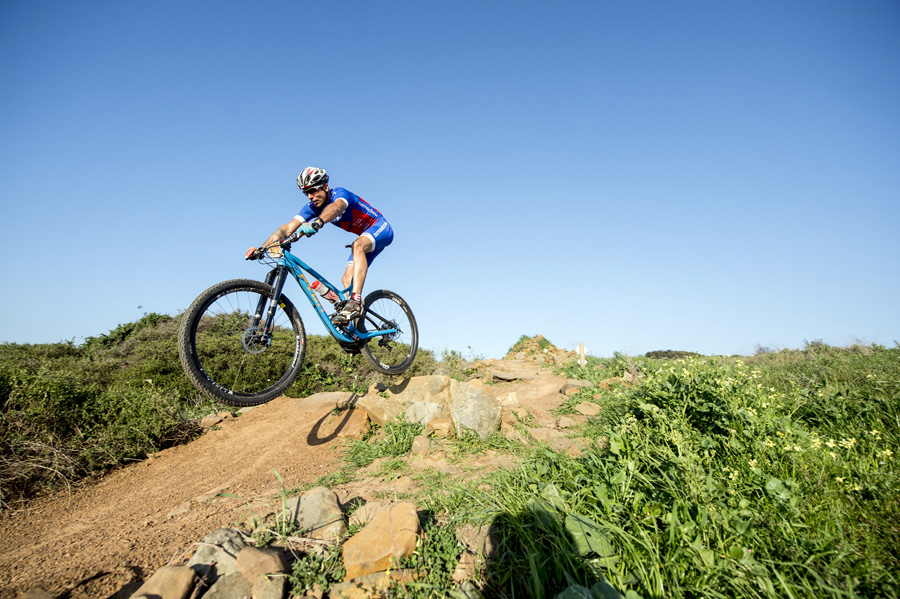
Photo: Craig Kolesky
Through a lot of media exposure the value of sponsoring mountain biking events, has seen South Africa become a benchmark for the hosting of quality racing events comparable and even exceeding international standards. What we see is that on balance the endurance of South African mountain bikers is above average compared to other countries. Although, what is lacking is the development of technical skills and the hosting of more technical races such as cross country.
When Redbull purchased the cross-country (XCO) publishing media rights a couple of years ago, this changed the whole format of cross-country racing into a shorter, more dynamic and skillful format (the cross country lap racing format originated formally in the early 90’s – TREAD) in order to make it more attractive to spectators. This required the athletes to completely restructure their training and also gain new skill sets to master man-made obstacles such as gap-jumps, drops and rock-gardens. Cross-country racing can almost be seen as a different sport within mountain biking. In order to handle a cross-country course competitively, you need to be very focused and skillful as there is no room for mistakes. The technical component has become so important that riders are required to develop excellent skills on the bike.
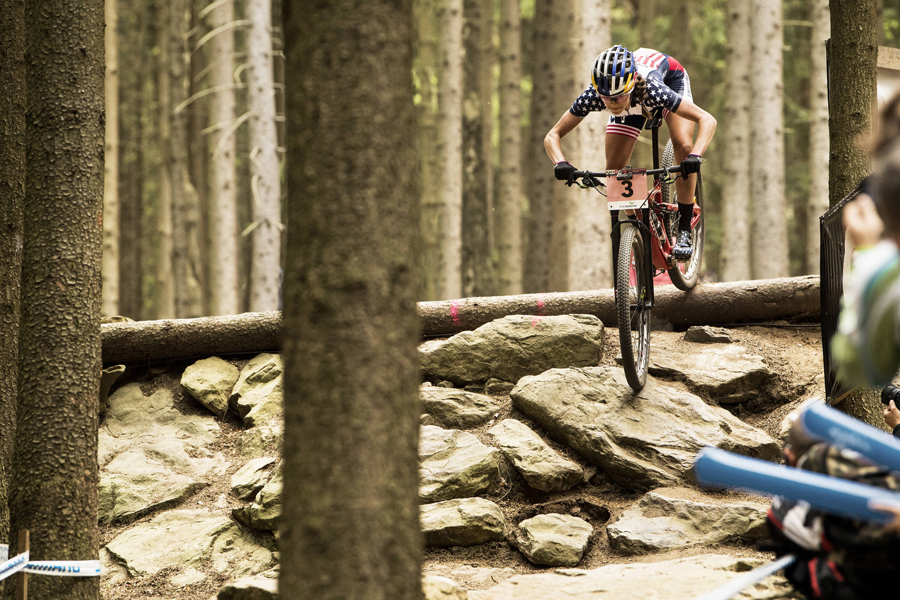
Photo: Jan Kasl / Red Bull Content Pool
The main element in cross-country racing is to be an extremely competent technical rider. Coordinative cross and strength training are now of key importance for effective training preparation.
The last Absa Cape Epic was a showcase that cross-country riders have also dominated long-distance stage racing and have put marathon racers with less technical skills and explosive power far behind. This might have created a new era of a more complete and skillfully versatile rider versus a strong endurance athlete who doesn’t have enough technical skills. This fact might enforce the importance of cross-country racing to teach mountain bikers more technical skills and become a more competent overall rider.
Unfortunately, in the last few years, cross-country has not been equally supported with sponsorship money and media interest as marathon and stage-racing. The future of young mountain bike talents is coming through cross-country racing, as young riders are not allowed to participate in long distance races due to age restriction. The few marathon-type shortened routes for under-18 riders are predominantly aimed for novice mountain bikers and there is no technical skill required, hence fold, the younger generation can’t acquire any technical experience on these courses. Therefore, the only way of building a future generation of skillful mountain bike talent is through cross-country racing. The whole development structure of young mountain bike athletes is dependent on having more National and Provincial cross-country race series that have enough funding and the man-power to organize racing events.
In the Western Province we are very fortunate to have two individuals that have been dedicated using their private time and resources to drive and organize cross-country races. The two main individuals are Brian Strauss and Stephen van der Walt. The Spur school series is moving in the right direction but must pay more attention to the fact that their courses must be technical enough to challenge young riders from an early age.
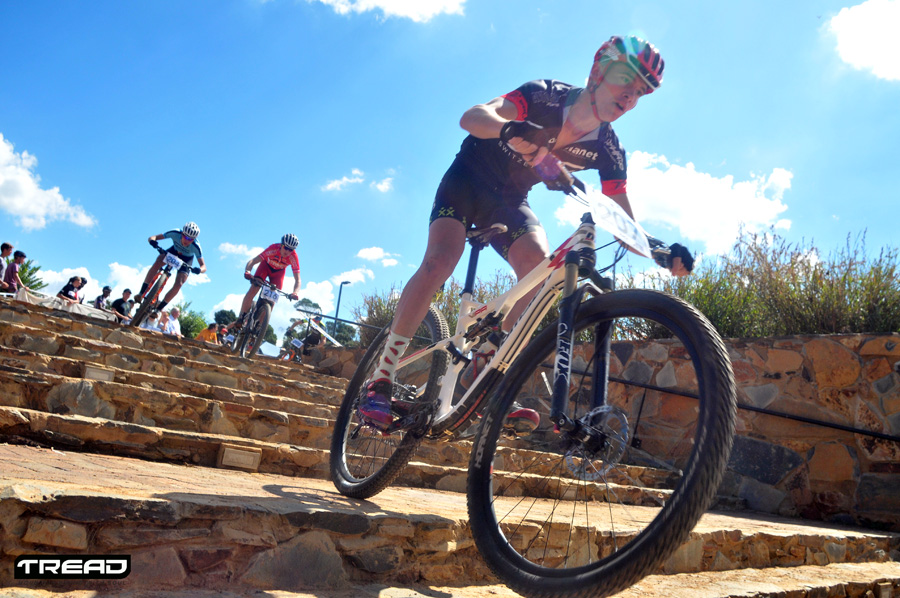
Photo: Dino Lloyd/TreadMTB
In the marathon scene there are some individuals that have not succeeded in cross-country racing and have therefore sought a career in marathon racing alongside athletes from a road-cycling background, who may also not have as advanced technical skill. What we can see is that a skillful cross-country racer can also be a top marathon racer but a marathon racer with good endurance but lacking a strong technical skillset will not be seen on the podium at a cross-country race.
When I raced the BC bike race in Canada a couple of years ago, I was amazed at the high skill and competence of the average mountain biker, which might be an indication of a whole different culture of technical mountain bike riding introduced through technical mountain bike races and the focus on riding more technically demanding terrain.
In South Africa there are very few mountain bike races that feature technical courses, which is preventing a whole mountain bike generation from becoming a more complete and technically versatile rider. This is the true essence of mountain biking. A lot of mountain bike event organizers are catering their events and courses for the masses allowing riders with any skillset to make it easily through the race. So we find ourselves in a catch-22 situation in which a low-skilled rider is encouraged to participate on an easier-to-manage route and more advanced riders trying to improve their technical skills are not finding what they are looking for. Often in marathon and stage races you are bottle-necked by athletes getting off of their bikes or struggling to master small basic obstacles and technical trail sections to the frustration of better technical riders that don’t have the best endurance.
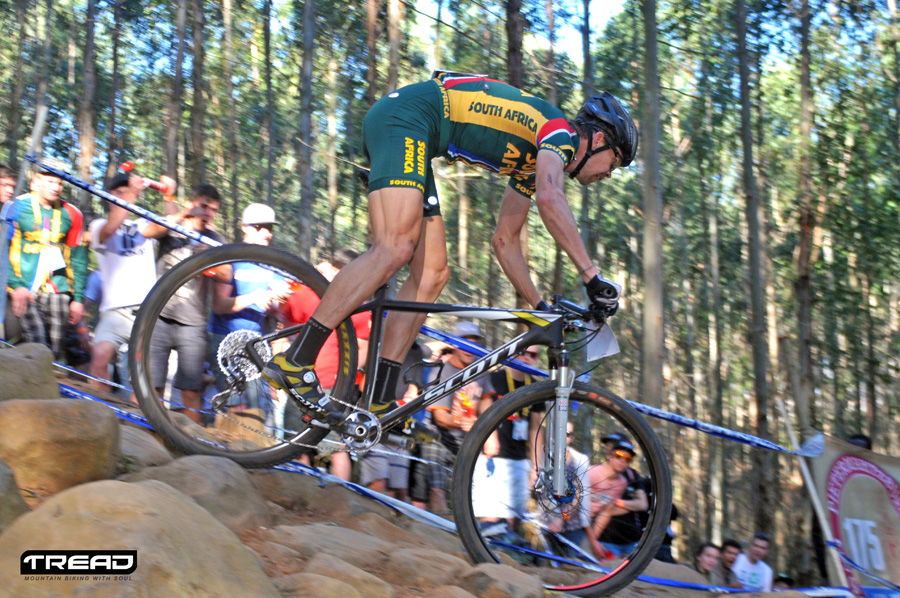
Photo: Dino Lloyd
So what is needed from my point of view is to help the mountain bike sport in South Africa support all cross country racing in terms of participation and financial support, to create more technical mountain bike events. What is also needed is to outline more technical marathon and stage-race courses.
There is a misperception in the length of a mountain bike course and duration. If you have to conquer a shorter distance of around only 50kms but you make the course more technical, the duration of completing the course can still take 4 hours or more. So if the philosophy of a marathon race is the length of the duration then by shortening the courses but making them more technical, this philosophy can be achieved.
The leaders in following this concept are the organizers of the “U-race” in Pikotberg. They have created the most technical mountain bike stage race in South Africa with not only the most scenic riding, but also non-stop technical trails that demand a high skillset that can be regarded as a Disney land for mountain bikers. Hopefully this is a concept that will be considered by more race organizers in the future, or restructuring races like Sani2C and Wine2Whales, which provide 3 different racing events catering for beginner, social and racing where the routes should differ considerably in their technical layout. People can then choose from less to more highly demanding routes depending on their riding ability and skills.
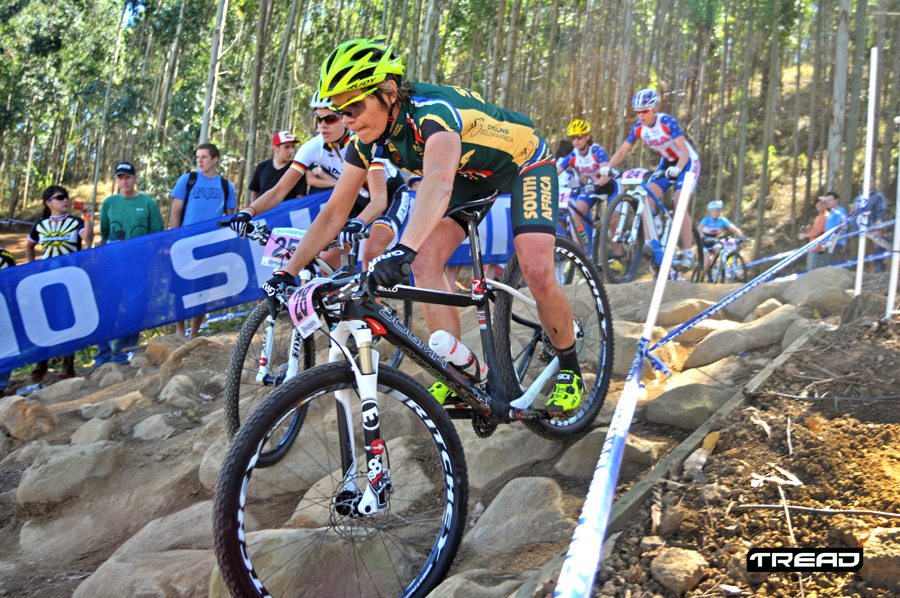
Photo: Dino Lloyd
Concluding from the above, is that the South African mountain biking scene would benefit from partaking in more cross-country races and focusing on improving their technical skills to become a more confident and complete mountain biker to have even more fun out on the trails.

All rights reserved.


